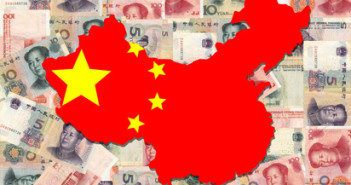Aggressive quantitative easing programmes from the US and Japan are creating a dilemma for the Chinese leadership, which may only be resolved by revaluing the China Yuan upwards versus the US Dollar.
Inflation and unemployment are two major preoccupations for the Chinese leadership as a nasty bout of either can create social instability. But at the moment inflation may be a bigger worry than joblessness. Departing Premier Wen Jiabao warned that keeping prices in check would remain a key challenge for the country’s policy makers.
China’s consumer prices registered a 10-month high in February of 3.2% year-on-year, but more seriously in terms of prompting popular discontent food prices rose 6%. China’s New Year festivities are partly to blame, but the flow of speculative capital driven by foreign central bank QE programmes could ensure China’s inflation rate remains elevated possibly even surpassing the 3.5% target rate.
To an extent because CNY has risen in value along with USD, China has become a magnet for capital flows with the People’s Bank of China recording 684 billion Yuan ($109 billion) worth of foreign currency exchanged in January, a record for a single month.
Large inflows of hot money can spur imbalances in China’s economy as it fuels the already large shadow banking system and speculative activity real estate and even commodities, making them more expensive for industry and households.
China could simply try and clamp down on those capital inflows and that’s still a possibility. But it has porous capital controls and the authorities want China to become an international finance centre and for the CNY to one day become a reserve currency. Enforcing stricter capital controls would be a retrogressive step in that direction.
The downside of allowing CNY to appreciate, especially against USD, is that it will make many of China’s exporters uncompetitive and that will create unemployment in the coastal cities. Also, rebalancing towards a consumer driven economy and more value added activity still has a long way to go.
Depending how a CNY revaluation was managed it could suck in even more hot money if speculators were left anticipating further appreciation. But it should make the cost of fuel and food cheaper for Chinese citizens and therefore sustain their disposable income, which would help develop a more consumer-driven economy. At the same time a stronger CNY would make it cheaper for Chinese companies to acquire assets abroad, such as mines, and encourage some outflows of money.
Another important factor, the US has stopped publicly accusing China of manipulating its currency. That could be an opportunity for China to review its currency peg without losing face and attribute such a move to domestic factors such as helping to control inflation.
In the end, aggressive QE from the US Federal Reserve and with the Bank of Japan joining the fray may prove far more effective in forcing the CNY higher than endless negotiations with the Chinese leadership. It would be an unfortunate conclusion to draw as aggressive QE isn’t without risks for those perpetuating it.
